Digital Poster
AI-Based Acquisition & Reconstruction: Part I
ISMRM & ISMRT Annual Meeting & Exhibition • 10-15 May 2025 • Honolulu, Hawai'i

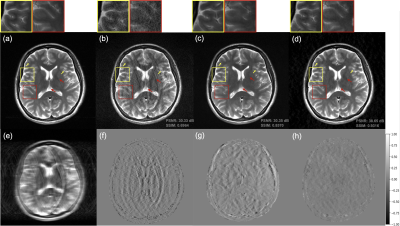 |
Computer Number: 49
2626. DCSOlve-MR:
Adaptive Integration of Generative AI and Compressed Sensing for
High-Fidelity MRI Reconstruction
M. Huang, D. Schmidt, Y. Zhao, A. Petrovic, R. Bammer
Monash University, Melbourne, Australia
Impact: By leveraging the strengths of both generative
AI and compressed sensing (CS), the proposed
method faithfully restores images from undersampled
measurements, achieves high-fidelity MRI reconstructions,
and does not obfuscate the diagnostic quality of the scan or
downstream AI tasks.
|
|
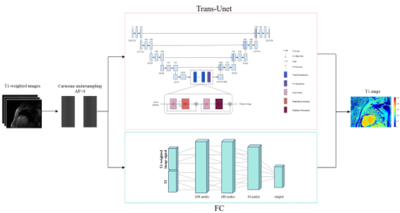 |
Computer Number: 50
2627. Fast
Cardiac T1 Mapping in Three Heartbeats with A Transformer
Integrated Network
H. Li, Q. Liu, H. Shi, H. Gu, Y. Dong, C. Zhu, B. Li, Z.
Zhong, G. Dan, Z. Chen, Y. Liu, Q. Liu, Y. Ye, J. Xu, J.
Hou, F. Fang, Y. Zhu, S. Liu, H. Wang, D. Liang, Y. Zhou
UIH America Inc, Houston, United States
Impact:
The approach achieves cardiac T1 mapping within three cardiac cycles, clinically reducing the breath-hold time and causes less discomfort to patients. Meanwhile, the integrated network takes advantages of current deep learning methods and significantly improves the reconstruction quality. |
|
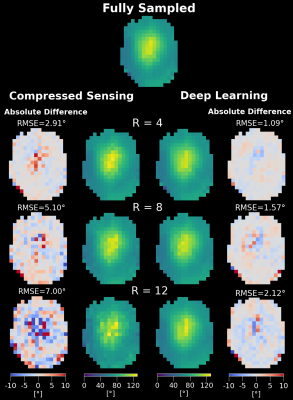 |
Computer Number: 51
2628. Deep
learning accelerated Sandwich for 3D multi-channel B1+ mapping
at 7T in less than 10 seconds
N. Pato Montemayor, J. Philippe, J. Kent, A. Hess, A.
Klauser, E. Sleight, L. Bacha, T. Di Noto, B. Maréchal, P.
Liebig, J. Herrler, D. Nickel, R. Heidemann, J-P Tiran, T.
Kober, T. Hilbert, T. Yu, G. F. Piredda
Siemens Healthineers International AG, Lausanne, Switzerland
Impact: This study demonstrates a deep learning-based
method for rapid B1+ mapping
in ultra-high field MRI, significantly reducing acquisition
time to under 10 seconds while maintaining accuracy. The
approach enhances the efficiency of parallel transmission,
facilitating clinical applications at 7T.
|
|
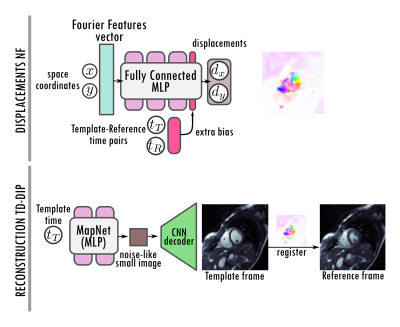 |
Computer Number: 52
2629. Self-supervised
motion-corrected reconstruction for single heartbeat cardiac
cine MRI at 1.5T and 0.55T using PINNs and Deep Image Prior
T. Catalán, R. De la Sotta, R. Botnar, F. Sahli-Costabal, C.
Prieto
Millennium Institute for Intelligent Healthcare Engineering, Santiago, Chile
Impact: The proposed approach enables TR-resolved single
heartbeat cardiac cine at both 1.5T and 0.55T. This
acceleration can be leveraged to reduce scan time, for
example allowing more slides in the same breath-hold.
|
|
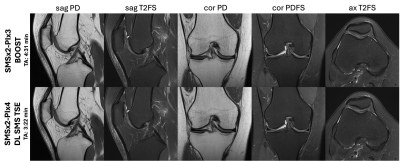 |
Computer Number: 53
2630. 8-fold
Accelerated TSE MRI: First Clinical Results of an End-to-End DL
Reconstruction Method for Combined SMS and Parallel Imaging
Acceleration
Y. Leonhardt, J. Vosshenrich, M. Mostapha, G. Koerzdoerfer,
E. Raithel, M. Nadar, M. Bruno, J. Fritz
Grossman School of Medicine, New York University, New York, United States
Impact: First clinical results for 8-fold accelerated
knee MRI using a dedicated end-to-end DL reconstruction
approach for combined SMS and PI acceleration demonstrate
image quality comparable to slower standard-of-care MRI,
holding promise for significantly faster clinical TSE MRI in
the future.
|
|
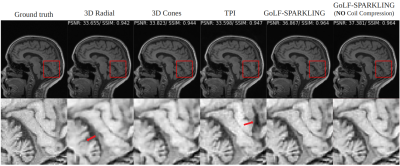 |
Computer Number: 54
2631. Benchmarking
3D Multi-Coil NC-PDNet MRI Reconstruction
A. Tanabene, C. G.R, A. Massire, M. Nadar, P. Ciuciu
Siemens Healthineers, Courbevoie, France
Impact: Achieving fast, high-quality reconstructions
with reasonable GPU memory usage demonstrates our approach's
viability for clinical research. Benchmarking the
GoLF-SPARKLING trajectory against established non-Cartesian
baselines in 3D multi-coil settings validates its future
application in more challenging experiments, notably at
higher resolutions.
|
|
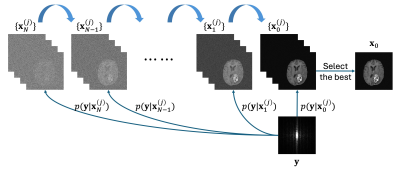 |
Computer Number: 55
2632. Consistent
MRI Reconstruction with Diffusion Models and Sequential Monte
Carlo
W. Jiang, W. Song, Y. Gao, N. Ye, F. Liu, H. Sun
The University of Queensland, Brisbane, Australia
Impact: This method enhances MRI reconstruction
consistency, increasing reliability for clinical use and
establishing a foundation for broader adoption in diagnostic
imaging and medical diagnostics.
|
|
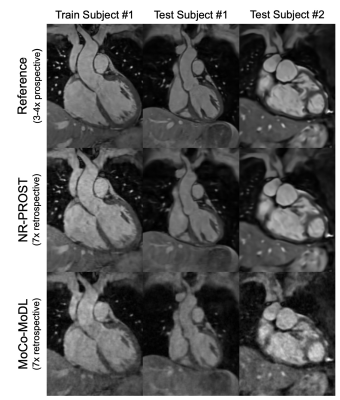 |
Computer Number: 56
2633. Motion-Corrected
Deep-Learning Reconstruction Framework for 3D Whole-Heart MRA at
0.55T
M. Paredes, A. Phair, A. Fotaki, R. Botnar, C. Prieto
Millennium Institute for Intelligent Healthcare Engineering, Santiago, Chile
Impact: The proposed approach validates MoCo-MoDL
feasibility at 0.55T, enabling 7-fold undersampled,
non-rigid motion-corrected CMRA with 1.36min acquisition and
42s reconstruction, showing promise for clinical
implementation in low-field environments and making MRI more
attainable and cost-effective.
|
|
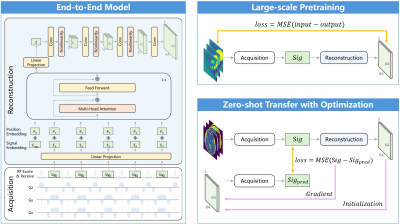 |
Computer Number: 57
2634. Self-Supervised
Pretraining of Joint Acquisition and Reconstruction for Fast
Quantitative MRI
H. Shang, S. Jia, D. Liang
Shenzhen Institutes of Advanced Technology, Chinese Academy of Sciences, shenzhen, China
Impact: Large-scale pretrained end-to-end model can be
an alternative to long standing Fourier Transform foundation
for qMRI. The new capability of contemporary
spatial-physical encoding opens up new possibility to push
current speed limit of qMRI.
|
|
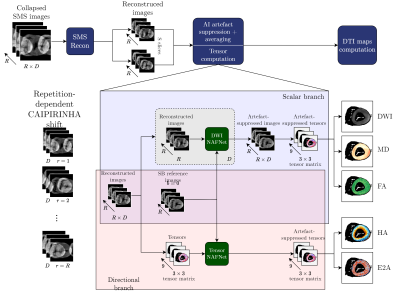 |
Computer Number: 58
2635. Accelerating
DT-CMR with Variable CAIPIRINHA Shifts and Artefact-Aware
AI-based SMS reconstruction
M. Tänzer, E. j. Lim, H. (. Qiu, A. Scott, P. Ferreira, D.
Rueckert, G. Yang, S. Nielles-Vallespin
Imperial College London, London, United Kingdom
Impact: By substantially reducing acquisition times
while preserving diffusion map quality, this work helps
bridge the gap towards clinical adoption of DT-CMR,
advancing non-invasive assessment of cardiac microstructure
for diagnosing and monitoring of cardiac disease.
|
|
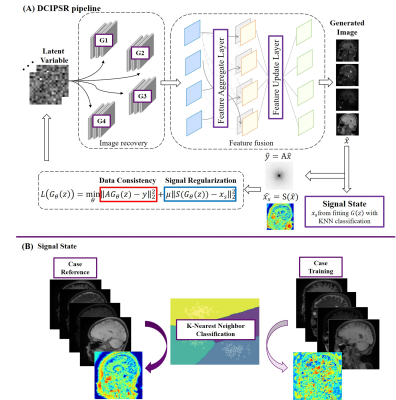 |
Computer Number: 59
2636. DCIPSR:
A Self-supervised Networks with Signal Regularization for
Multi-Contrast MRI Reconstruction
H. Wei, Z. Li, J. Zou, H. Meng, P. Ma, X. Liu, R. Li
Tsinghua University, Beijing, China
Impact: We proposed a self-supervised MCMRI
reconstruction method with Densely Connected Image
Prior(DCIP) and Signal Regulation(SR). The success of DCIPSR
under high undersampled rate indicates the potential to
reconstruct MCMRI when large training dataset is
unavailable.
|
|
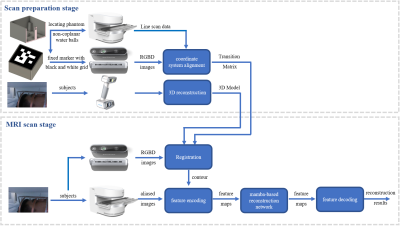 |
Computer Number: 60
2637. Dep2SMS:
Simultaneous Multi-Slice Reconstruction via Deep Learning with
Auxiliary Depth Camera Guidance
M. Song, X. Hao, F. Qi, Z. Guo, Y. Li, B. Qiu
University of Science and Technology of China, Hefei , China
Impact:
We novelty introduce the depth camera into the MRI system to capture contour to assist SMS reconstruction. We utilize the Mamba-based framework with intra-patch convolution and linear-complexity long-range attention for SMS reconstruction to capture fine structural and global texture features. |
|
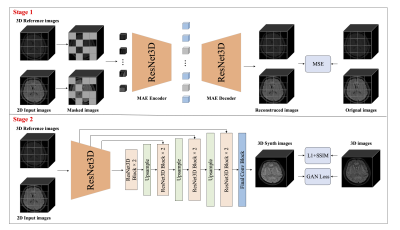 |
Computer Number: 61
2638. Multi-Contrast
MR Imaging Acceleration: Transform 2D Low-Resolution into
High-Resolution 3D Images with Auxiliary Contrast in 3D
Acquisition
Z. Zhang, Z. Zhou, L. Xiang, X. Song, X. Wei, Y. Li
Subtle Medical Inc, Guildford, United Kingdom
Impact: The developed approach allows multi-contrast
brain low-resolution 2D scans with an auxiliary
high-resolution 3D reference scan to produce multi-contrast
high-resolution 3D images. Clinical evaluation on
synthesized 3D brain images and extension to other
applications may be worth further investigation.
|
|
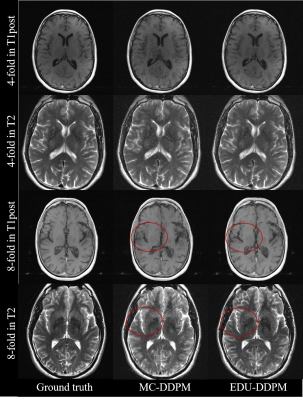 |
Computer Number: 62
2639. Denoising
Diffusion Probabilistic Model with Dual-domain Entropy and
Stochastic Differential Equations on High Undersampling
Reconstruction
Z. Li, Y. Yang, J. An, C. Ling, Z. Wang, Y. Zhuo, R. Xue, Z.
Zhang
State Key Laboratory of Brain and Cognitive Science, Institute of Biophysics, Chinese Academy of Sciences, Beijing, China
Impact: The proposed EDU-DDPM significantly improves MRI
reconstruction at high subsampling factors, outperforming
DDPM on fastMRI and compressive sensing on 7T TOF-MRA data.
This advancement enhances fidelity of reconstruction.
|
|
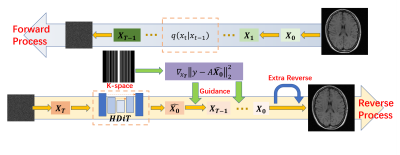 |
Computer Number: 63
2640. Low-field
MRI reconstruction with hourglass diffusion model and posterior
sampling strategy
Y. Lian, J. Zhang, H. Guo
Center for Biomedical Imaging Research, Department of Biomedical Engineering, School of Biomedical Engineering, Tsinghua University, Beijing, China
Impact: An efficiency deep learning based method to
accelerate the acquisition in low-field MRI and improve the
image SNR
|
|
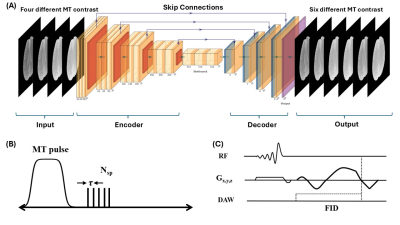 |
Computer Number: 64
2641. Accelerated
Quantitative Magnetization Transfer Mapping with Deep Learning (MTAcqNet)
Y. Wang, J. Lo, J. Athertya, Y. Ma
Department of Electrical and Computer Engineering, University of California, San Diego, La Jolla, United States
Impact: The proposed MTAcqNet accelerates MT data
acquisition and enables faster macromolecular proton
fraction mapping using quantitative MT modeling. By reducing
scan time, it facilitates rapid clinical translation of
quantitative MT imaging, providing valuable insights into
macromolecular content in the brain.
|
The International Society for Magnetic Resonance in Medicine is accredited by the Accreditation Council for Continuing Medical Education to provide continuing medical education for physicians.